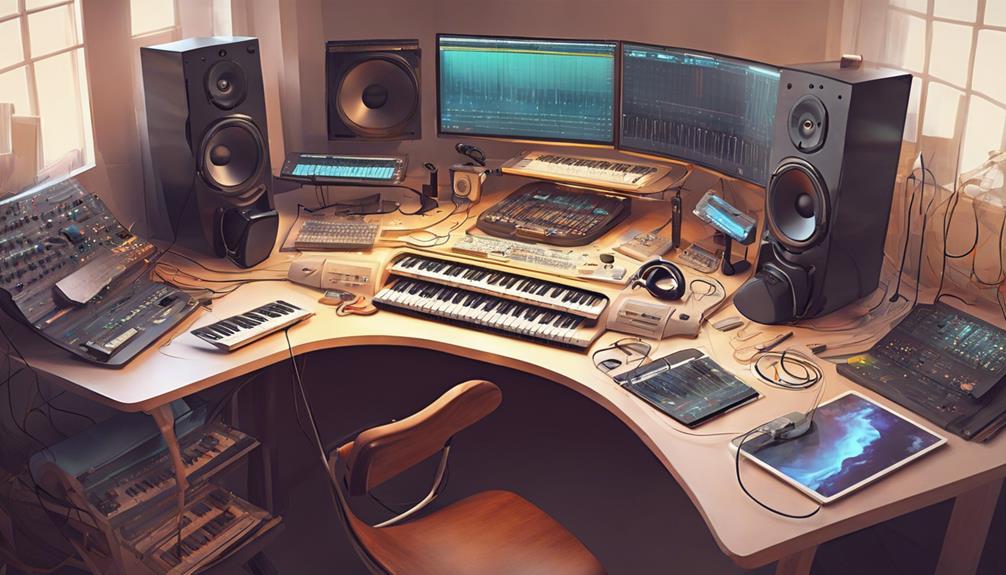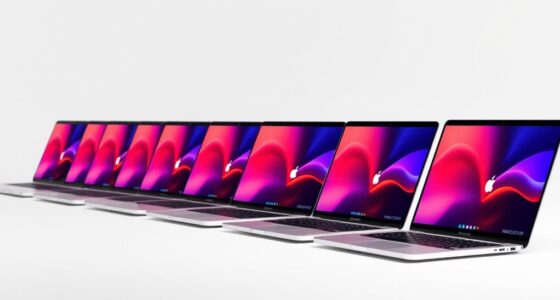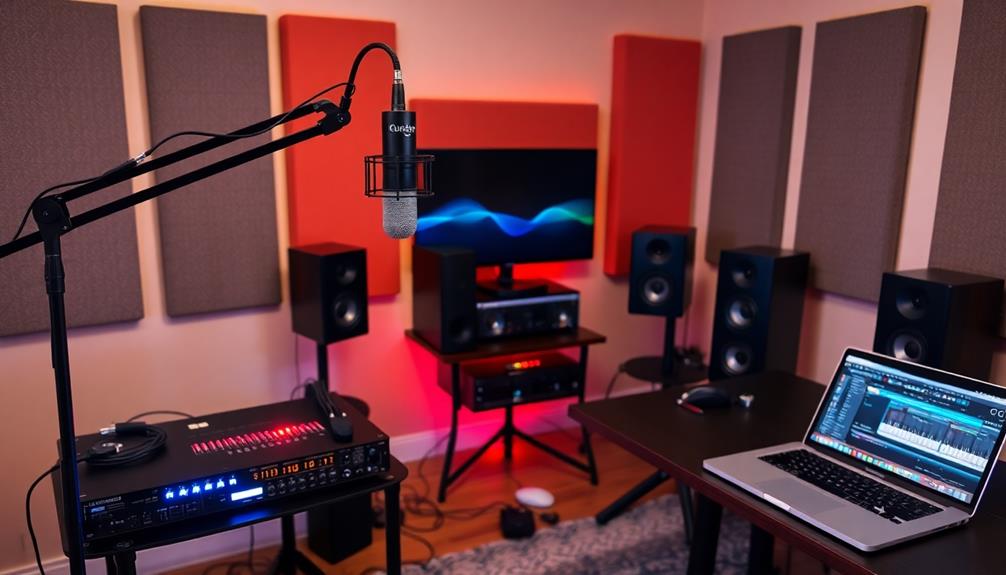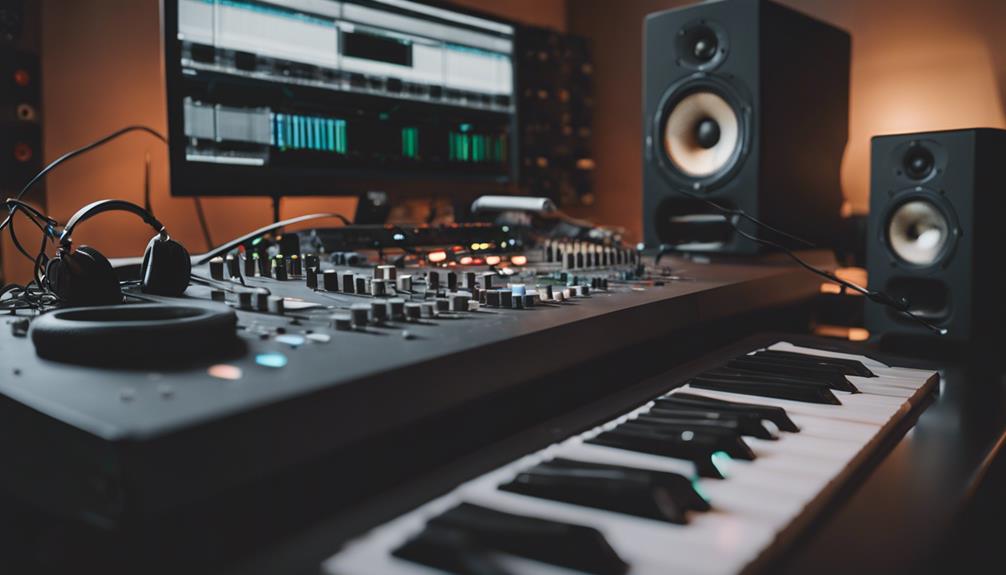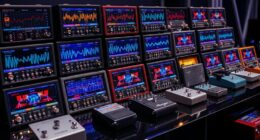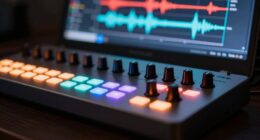When it comes to unleashing my creative potential in music production, I need a Linux distro that's tailored to my needs. After researching, I've found that Ubuntu, Linux Mint, and Debian are top contenders. These distros offer seamless hardware compatibility, active community support, and a wide range of music production software. Ubuntu, for instance, has a user-friendly interface and low resource demands, making it perfect for music production. Linux Mint and Debian also offer pre-configured environments for music production, streamlining my workflow. By choosing the right distro, I can focus on creating high-quality music without breaking the bank – and there's more to explore on this topic. Additionally, these distros support a variety of digital audio workstations (DAWs) like Ardour, LMMS, and Audacity, which are essential for crafting professional tracks. The availability of low-latency kernel options ensures minimal audio lag, making any of these the best Linux music production OS choices for artists who value performance and reliability. With these tools at my fingertips, I can elevate my music production game while enjoying the flexibility and customization that Linux provides.
Key Takeaways
- Hardware compatibility with audio interfaces, MIDI controllers, and other gear is crucial for seamless music production.
- Active community support and forums aid in resolving hardware compatibility issues and provide valuable resources.
- Availability of a wide range of music production software is essential for project success and creative freedom.
- Some Linux distributions offer pre-configured environments tailored for music production, simplifying setup and workflow.
- A user-friendly interface, low resource demands, and software compatibility are key for a smooth music production workflow.
BrosTrend Linux USB WiFi Adapter for Ubuntu and Windows

As a music producer, I need a reliable internet connection to stay inspired and focused, which is why I rely on the BrosTrend Linux USB WiFi Adapter for Ubuntu and Windows to deliver fast and secure connectivity for my Linux-based music production setup.
This adapter is compatible with various Linux distributions, including Ubuntu, Raspberry Pi OS, Debian, and Linux Mint, making it a versatile option for my music production needs. With dual-band support, it provides a combined speed of 1200Mbps, ensuring seamless streaming, gaming, and other online activities.
The adapter also supports multiple working modes and advanced encryption security, giving me peace of mind while working on my music projects. Additionally, the adapter is lightweight and compact, making it easy to carry around and use on the go.
Best For: Music producers, gamers, and individuals who require fast and secure internet connectivity on Linux-based systems.
Pros:
- Compatible with various Linux distributions, including Ubuntu, Raspberry Pi OS, Debian, and Linux Mint
- Dual-band support provides a combined speed of 1200Mbps for seamless streaming, gaming, and other online activities
- Advanced encryption security ensures privacy and peace of mind while working online
Cons:
- Not compatible with Arch Linux, Fedora, Kali Linux, and other non-Debian based distributions
- Issues with plug-and-play functionality on certain distributions
- Some users have reported difficulties with installation on non-Debian based systems
Music Theory for Computer Musicians

For music producers and computer musicians looking to elevate their craft, 'Music Theory for Computer Musicians' by Michael Hewitt is a valuable resource that bridges the gap between traditional music notation and computer-based music production. This book presents music theory concepts in a practical and accessible way, using examples from music software programs like Reason.
I've found that the clear and concise presentation of information, along with quizzes at the end of each chapter, helps reinforce key points and solidify my understanding of music theory fundamentals. The exercises in the book are also beneficial for enhancing my understanding of music theory, and I appreciate how they've improved my songwriting and compositional techniques.
By engaging with the exercises and examples provided, I've gained a better grasp of music theory concepts, which has been instrumental in taking my music production skills to the next level.
Best For: Individuals looking to enhance their craft of songwriting and music production, particularly those who want to bridge the gap between traditional music notation and computer-based music production.
Pros:
- Presents music theory concepts in a practical and accessible way using examples from music software programs like Reason.
- Includes quizzes at the end of each chapter to reinforce key points and exercises to enhance understanding of music theory.
- Helps improve songwriting and compositional techniques, leading to a better grasp of music theory concepts.
Cons:
- Some readers found the exercises in the book to be beneficial, but others may not find them as helpful.
- There are mentions of missing components like CDs or download options, indicating potential issues with supplementary materials.
- May not provide a comprehensive music theory education, but rather serves as a supplement to traditional music theory learning.
AreTop 50-Pack Flash Drive 8GB USB 2.0 Metal Memory Sticks

As musicians and producers, we require dependable storage solutions, which is where the AreTop 50-Pack Flash Drive 8GB USB 2.0 Metal Memory Sticks come in, offering a convenient and fast storage solution for our music files and projects.
With a bulk pack of 50 flash drives, each with a colorful lanyard, we can easily store and transport our music files, samples, and projects between different devices and locations. The metal construction guarantees durability and stability, while the USB 2.0 interface provides fast data transfer speeds.
I've found that these flash drives are widely compatible with various devices, making them ideal for collaborative work or when working on different projects. While some users have reported issues with corrupt files and malfunctioning drives, the majority of customers have praised the convenience and quality of these flash drives.
Best For: Musicians, producers, and individuals who need a convenient and fast storage solution for their files and projects.
Pros:
- Convenient storage solution with a bulk pack of 50 flash drives, each with a colorful lanyard
- Fast and stable performance for safe data storage with metal construction and USB 2.0 interface
- Widely compatible with various devices, making it ideal for collaborative work or working on different projects
Cons:
- Some users have reported issues with corrupt files and malfunctioning drives
- May not be suitable for users who require high-speed data transfer, as it only supports USB 2.0
- Quality control issues, as some users have received defective flash drives
Factors to Consider When Choosing a Linux Distro for Music Production

When selecting a Linux distro for music production, I consider several key factors that can make or break my creative workflow. First and foremost, I need a distro that's compatible with my hardware, ensuring seamless integration with my audio interfaces, MIDI controllers, and other essential gear.
Additionally, I look for distros that offer a wide range of music production software, a user-friendly interface, and low resource demands, all while being backed by a supportive community.
Hardware Compatibility Needs
I need to guarantee my music production gear works seamlessly with any Linux distribution I choose, so I'm prioritizing hardware compatibility. As a music producer, I rely on specific audio interfaces, MIDI controllers, and other hardware to create high-quality tracks.
Thus, it's important to select a Linux distribution that supports my equipment. I check if the distro has pre-installed audio drivers and supports low-latency audio processing, making sure that my gear functions as intended.
A robust community and active support forums are also vital in case I encounter hardware compatibility issues. I research specific audio software requirements and their compatibility with different Linux distributions to maintain smooth music production workflows.
Software Availability Counts
Often, the success of a music production project hinges on the availability of specialized software, making it essential to choose a Linux distribution that offers a wide range of music production applications. As I explore the world of Linux distros, I've come to realize that not all distributions support the same range of applications.
Some distros offer easy access to audio editing, recording, and production tools in their software repositories, while others may require additional setup and configuration.
I'm particularly interested in distributions that are specifically tailored for audio production, providing a pre-configured environment for music creators. For instance, I look for support for popular digital audio workstations (DAWs) like Ardour, LMMS, or Bitwig Studio.
Additionally, I make sure that the Linux distribution provides reliable support for audio plugins and libraries commonly used in music production. By considering these factors, I can confidently choose a Linux distro that meets my music production needs, allowing me to focus on creating exceptional music without any software-related hurdles.
User Interface Matters
As I set up my music production workflow, I realize that a user-friendly and intuitive interface can make all the difference in streamlining my creative process on a Linux distribution. A well-designed interface can enhance workflow efficiency, allowing me to focus on the music rather than struggling with the tools.
Customizable desktop environments and themes can also improve the aesthetic appeal and usability of the interface, making it more enjoyable to work with. Moreover, accessibility features like keyboard shortcuts and menu organization can greatly streamline tasks and navigation within music production software.
Consistent design principles and layout coherence are also vital, as they contribute to a cohesive user experience. Ultimately, the user interface can make or break my productivity, so it's crucial to choose a Linux distro that prioritizes these factors.
Resource Demands Low
When it comes to music production, choosing a Linux distribution with low resource demands is crucial to guarantee seamless performance of software and plugins, even on older hardware. I've found that lightweight distros like Lubuntu, Xubuntu, and Linux Lite are popular choices for running music production software efficiently. These distros come with minimalistic desktop environments like LXDE, XFCE, or Openbox, which optimize system resources for music production tasks.
This means I can allocate more resources to my digital audio workstation (DAW) and plugins, ensuring smooth performance and minimizing system slowdowns or crashes.
Additionally, I look for distros that offer low-latency kernel options or real-time kernel patches, which are essential for improved audio processing and recording capabilities. By choosing a Linux distro that focuses on performance optimization, I can enhance my overall music production experience.
With a low-resource-demanding distro, I can work on complex projects without worrying about system crashes or slowdowns, allowing me to focus on creating high-quality music.
Community Support Essential
Beyond optimizing system resources, I've found that a Linux distribution's community support is essential for music production, as it provides a wealth of resources, troubleshooting assistance, and opportunities for collaboration and growth.
A strong community guarantees access to forums, blogs, and user groups where I can seek advice and guidance from experienced music producers. This collective knowledge base is invaluable in resolving issues quickly, as community members often share their experiences and solutions.
Additionally, community involvement leads to timely updates, patches, and user-generated content tailored to music production needs. I've discovered new tools, plugins, and resources through community recommendations, expanding my creative possibilities.
Engaging with the community has also provided opportunities for networking, collaboration, and shared experiences with fellow music producers. A supportive community enhances my overall user experience, fosters creativity, and encourages innovation in my music production workflows.
Frequently Asked Questions
Can I Use Linux for Music Production if I'm Not Tech-Savvy?
"I'm not tech-savvy, but I can still use Linux for music production. With user-friendly distros like Ubuntu Studio, I can focus on creating music without getting bogged down in technical jargon."
Are Linux Distros for Music Production Compatible With Windows Software?
"As I ventured into the forest of music production, I wondered if Linux distros could harmonize with Windows software. Thankfully, many Linux distros offer compatibility through Wine, allowing me to run Windows apps, and some even offer native alternatives."
Do I Need to Purchase Additional Plugins for Music Production on Linux?
Honestly, I don't need to break the bank on extra plugins; many Linux distros come with a plethora of free, open-source plugins that can help me produce high-quality music without additional costs.
Can I Use My Existing Audio Interface With a Linux Distro?
"I've got good news – most Linux distros support a wide range of audio interfaces, so I can likely use my existing one without any issues, saving me time and money."
Are Linux Distros for Music Production Suitable for Live Performances?
"I've used Linux for live performances with my band, and it's been a game-changer. For instance, I used Ubuntu Studio with my Roland Octa-Capture interface at a gig, and it worked seamlessly, with zero latency or issues."
Conclusion
As I reflect on my musical journey, I coincidentally stumbled upon the perfect Linux distros for music production. It was during a late-night search for tools to enhance my workflow that I discovered the ideal platforms tailored for audio creation. Exploring various options, I realized the importance of finding the best Linux OS for music, ones that offered low-latency kernels and support for professional-grade audio plugins. These distros not only streamlined my production process but also reignited my passion for creating soundscapes.
After experimenting with various options, I've narrowed it down to the top three that have unleashed my creative potential.
Whether you're a seasoned producer or a beginner, these distros will streamline your workflow and help you create mesmerizing tracks.
With the right tools and a dash of creativity, the possibilities are endless – and I'm excited to see what you'll produce.


